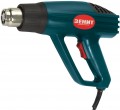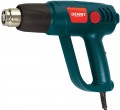Temperature adjustments
The number of outlet air temperature adjustments provided for in the design of the heat gun. The adjustment itself is an almost mandatory function for such a tool — after all, different types of work and different types of materials require their own temperature values, and without it you can either “underheat” or “burn through” the workpiece. The more adjustments provided in the design of the hair dryer — the finer the temperature settings, the easier it is to choose the mode that is optimal for a particular task. At the same time, it is worth noting that in this case we are talking about
step temperature control, while the most advanced option today is smooth control (see below).
Minimum heating temperature
The lowest air temperature that a heat gun can produce when operating in normal mode, in other words, the lower limit of the operating temperature range. Accordingly, the lower this limit, the wider the range, ceteris paribus, and the more versatile the tool: after all, for different jobs and temperatures, you need different ones. Some modern hair dryers have the ability to "cold" blowing, without heating.
Stepples t° control
The ability
to smoothly change the temperature of the air supplied by the heat gun. The meaning of temperature adjustments is generally detailed in the relevant paragraph above; here we note that smooth adjustment has a number of advantages over stepped. The main one is that the outlet temperature in such hair dryers can be adjusted very precisely, and at will, and not in accordance with the fixed values \u200b\u200bthat are set in the manufacturer's settings. Among the disadvantages of this option, one can note a higher cost than most step regulators — despite the fact that in fact high tuning accuracy is not required so often, usually in professional work.
Cold air mode
This option allows you to completely turn off the heating element, leaving only the fan running, or reduce the heating temperature to a minimum of 50 °C.
The cold air mode is necessary for cooling heated parts. For example, a stream of cold air will allow you to quickly cool the seams of hot melt adhesive. Most often, the cold air mode is represented by a separate position on the temperature mode switch, while cold air will be carried out at one single speed. But some models allow you to turn off the heating element by hardware, in which case cold blowing can be carried out in a wide range of speeds.

